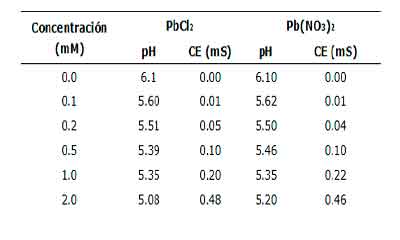Lead toxicity in germination and growth of Parkinsonia aculeata L. seedlings
DOI:
https://doi.org/10.29298/rmcf.v12i66.886Keywords:
Pollution, imbibition, woody, heavy metal, Mexican Palo Verde, toleranceAbstract
The high lead (Pb) concentrations in the ground limit the establishment of plants, which makes it necessary to identify tolerant species. The objective of this study was to determine the effect of PbCl2 and Pb(NO3)2 on the germination and early growth of Parkinsonia aculeata seedlings. In the laboratory, the seeds were soaked in solutions of PbCl2 and Pb(NO3)2 at concentrations of 0.0, 0.1, 0.2, 0.5, 1.0 and 2.0 mM. The seeds were weighed at the beginning and at the end (48 h); later, they were incubated and watered with their respective solutions (7 days). In the greenhouse, the seeds were sown in sand and watered (15 days) to determine the germination percentage (laboratory) and emergence (greenhouse): stem length, radicle and dry weight (both conditions). In the laboratory, PbCl2 and Pb(NO3)2 did not affect imbibition, but by increasing their concentrations, they significantly reduced germination by 18 and 26 %, respectively, as well as the dry weight of the stem (40 and 49 %), and radicle (40 and 57 %). In the greenhouse, the Pb compounds reduce emergence little, and did inhibit radicle growth; while Pb(NO3)2 inhibited in greater proportion the dry weight. The effect of Pb may differ depending on the Pb compound used, with Pb(NO3)2 presenting greater toxicity.
Downloads

Published
How to Cite
Issue
Section
License
Copyright (c) 2021 Revista Mexicana de Ciencias Forestales

This work is licensed under a Creative Commons Attribution-NonCommercial 4.0 International License.
The authors who publish in Revista Mexicana de Ciencias Forestales accept the following conditions:
In accordance with copyright laws, Revista Mexicana de Ciencias Forestales recognizes and respects the authors’ moral right and ownership of property rights which will be transferred to the journal for dissemination in open access.
All the texts published by Revista Mexicana de Ciencias Forestales –with no exception– are distributed under a Creative Commons License Attribution-NonCommercial 4.0 International (CC BY-NC 4.0), which allows third parties to use the publication as long as the work’s authorship and its first publication in this journal are mentioned
The author(s) can enter into independent and additional contractual agreements for the nonexclusive distribution of the version of the article published in Revista Mexicana de Ciencias Forestales (for example, include it into an institutional repository or publish it in a book) as long as it is clearly and explicitly indicated that the work was published for the first time in Revista Mexicana de Ciencias Forestales.
For all the above, the authors shall send the form of Letter-transfer of Property Rights for the first publication duly filled in and signed by the author(s). This form must be sent as a PDF file to: ciencia.forestal2@inifap.gob.mx
This work is licensed under a Creative Commons Attribution-Noncommercial 4.0 International license.





